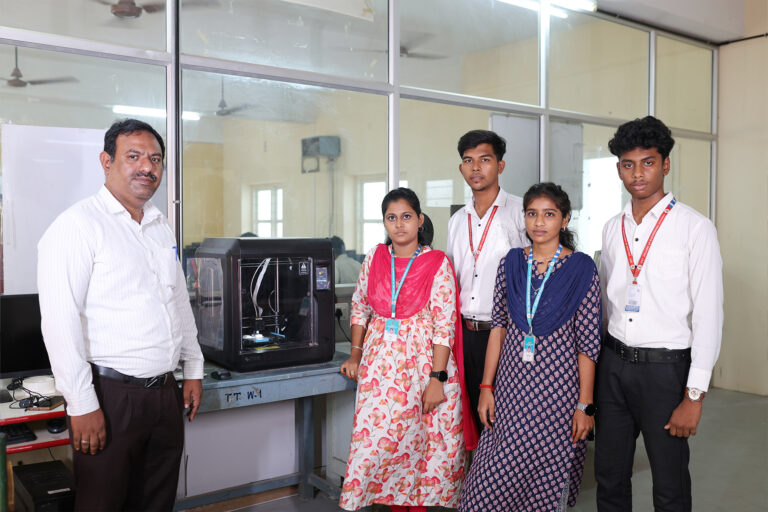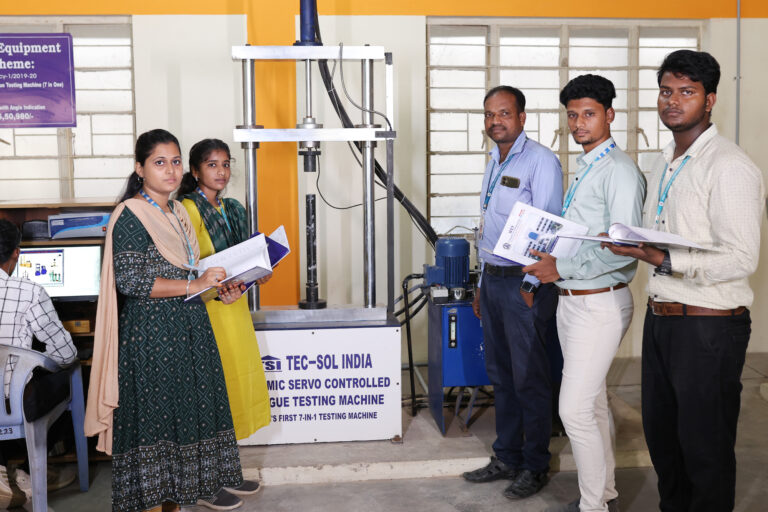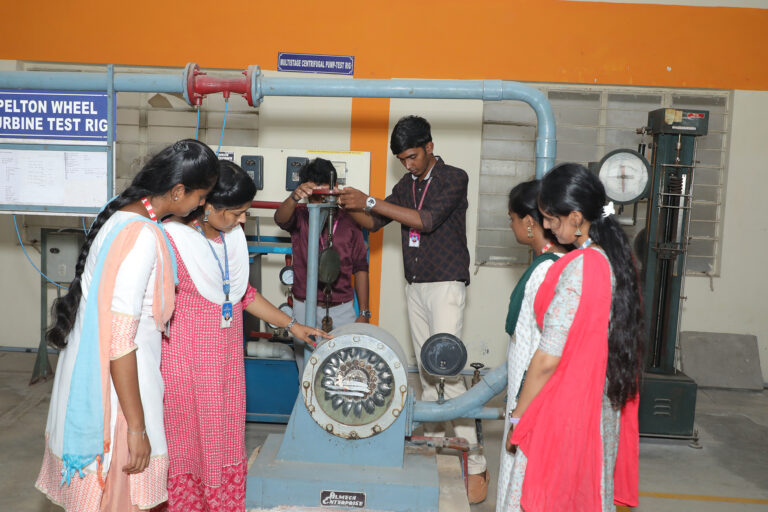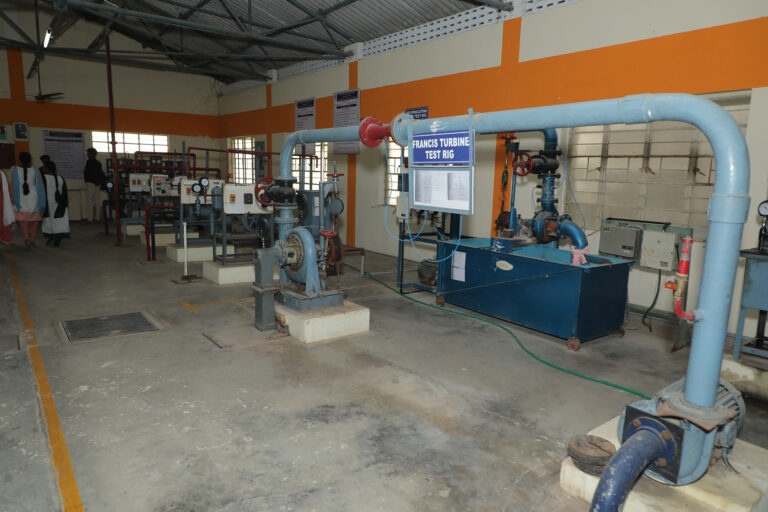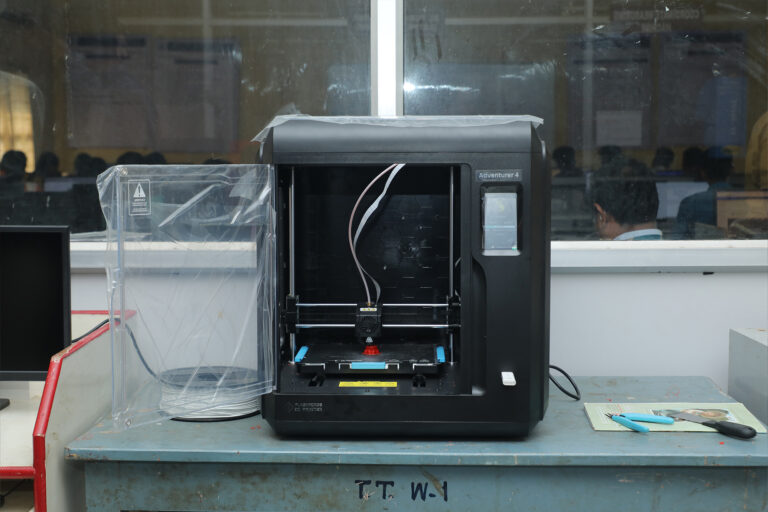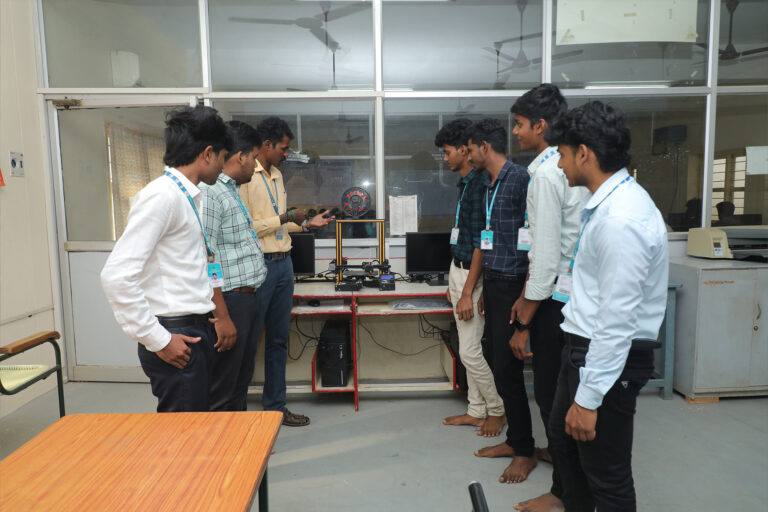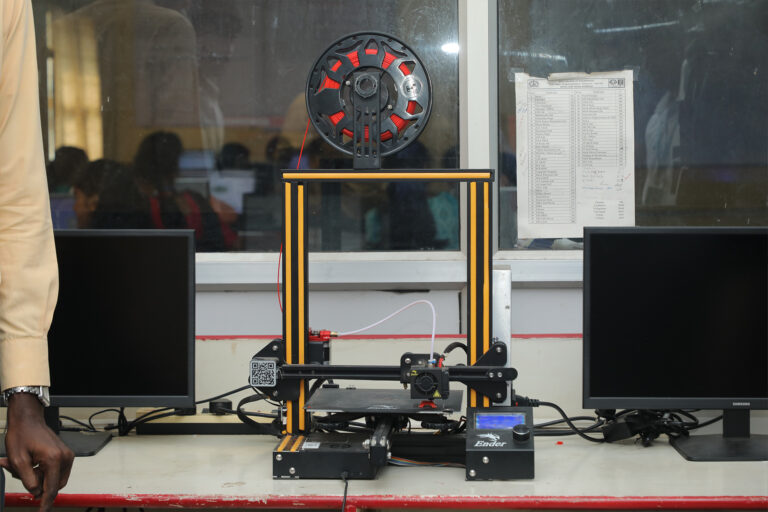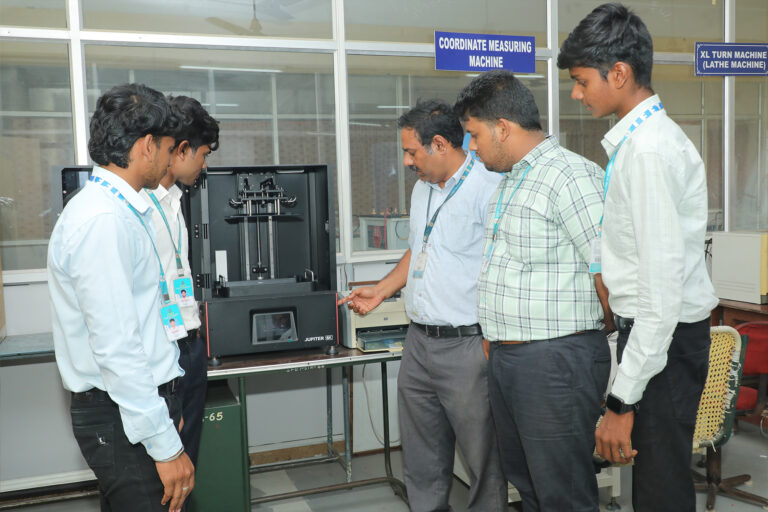
Prof. Vinodraj S
HoD (Mechanical)
The Department of Mechanical Engineering, established in 1998, offers a comprehensive four-year Bachelor of Engineering program with an annual intake of 60 students. Accredited by the NBA since 2008, the department is renowned for its success in consistently providing robust employment opportunities, both nationally and internationally, even during economic downturns. Students are equipped with advanced technical skills and fundamental knowledge in areas such as industrial, production, thermal, and management sciences, along with exposure to modern engineering practices. The program’s industry-oriented curriculum encourages innovation and holistic development, empowering students to excel in dynamic sectors like aerospace, automotive, nuclear, and energy. Its structured framework integrates core mechanical engineering knowledge with interdisciplinary fields like information systems and computer-integrated manufacturing. Graduates emerge as highly skilled professionals, ready to make meaningful contributions to diverse industries.
Department Vision
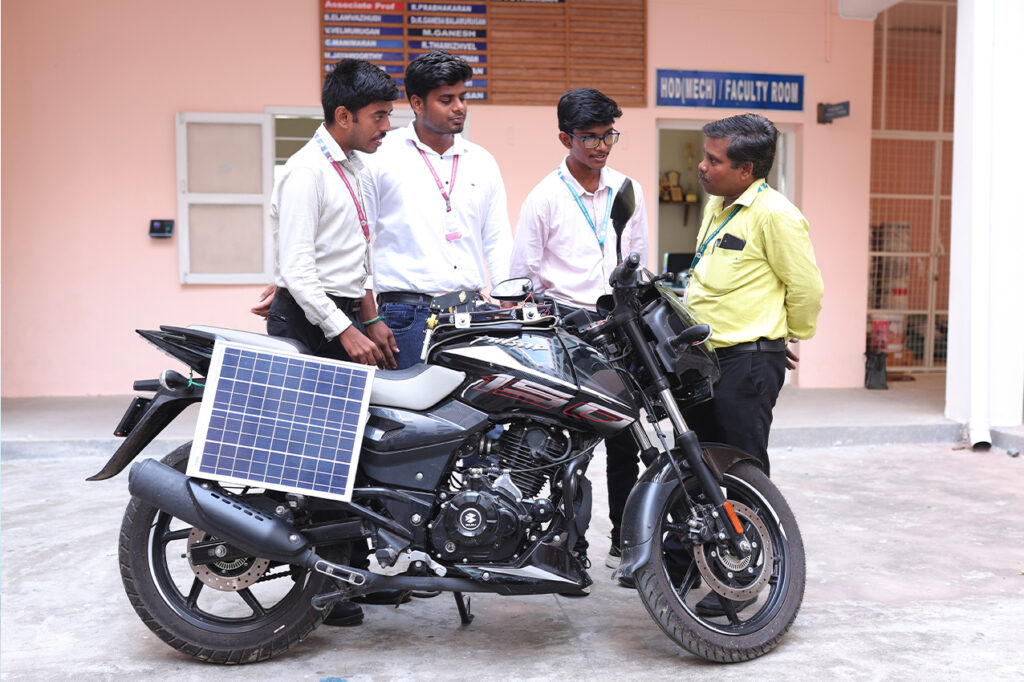
To excel as a leading center of mechanical engineering education and research, fostering innovation, sustainable development, and global excellence.
Department Mission
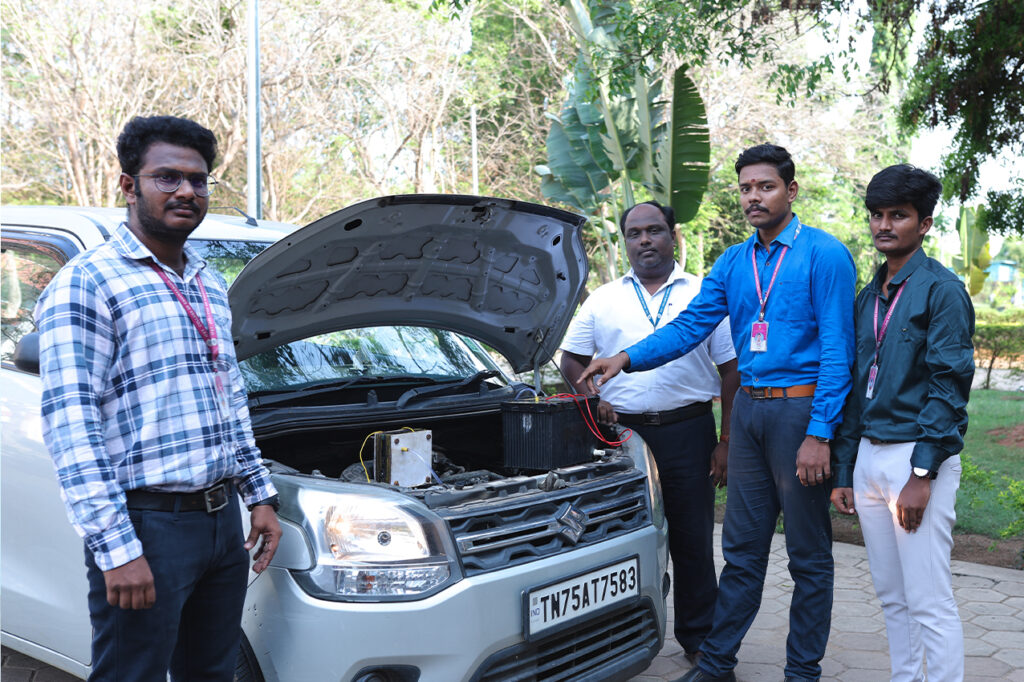
Offer a robust curriculum integrating theoretical knowledge with practical skills.
Encourage innovation and interdisciplinary research addressing real-world challenges.
Instill ethical values, leadership qualities, and lifelong learning in students.
Build strong partnerships with industries and provide exposure to modern practices, internships, and research opportunities.
Equip students with skills to address global challenges with sustainable solutions.
Department Activities
Book Chapter Publication
Dr. K. Ganesa Balamurugan published a Book Chapter titled “Laser Surface Texturing on the Tribological Behavior of Metal Matrix Composites for Passenger Car Component Applications – A Case Study” in an International Journal indexed in SCOPUS.
05 Jan, 2026
NPTEL Certification
Mr. R. Thamizhvel successfully completed an 8-week NPTEL course on Robotics offered by IIT Kharagpur and secured an Elite Category Score.
05 Jan, 2026
FDP Participation
Mr. R. Thamizhvel successfully completed an 8-week Faculty Development Programme (FDP) on Robotics through NPTEL, conducted by IIT Kharagpur.
05 Jan, 2026
Technical Achievements
M. Guberan, a Third-Year Mechanical Engineering student, secured the First Prize in the Technical Quiz event held at Vel Tech High Tech Engineering College, Chennai.
05 Jan, 2026
Technical Achievements
M. Sooryakumaar, R. Sabarinathan, and V. Saranraj, Third-Year Mechanical Engineering students, won the First Prize in the Connection event at Vel Tech High Tech Engineering College, Chennai.
05 Jan, 2026
Technical Achievements
A. Rohith, a First-Year Mechanical Engineering student, won the Second Prize in the Technical Quiz competition conducted by SRM University.
05 Jan, 2026
Program Educational Objectives
PEO 1
Graduates will apply mechanical engineering principles to design innovative and sustainable solutions that address real-world challenges. They will apply advanced modeling, analysis, and simulation tools to optimize the performance of mechanical systems.
PEO 2
Graduates will demonstrate leadership and effective teamwork in multidisciplinary settings. They will integrate knowledge from diverse fields such as mechatronics, automation, and materials science to create efficient and impactful engineering solutions.
PEO 3
Graduates will uphold ethical standards in their professional practice, continuously seeking opportunities for growth and development. They will adapt to emerging technologies, contributing to advancements in mechanical engineering while addressing global challenges responsibly.
Program Outcomes
POs describe what students are expected to know or be able to do by the time of graduation from the program. At the time of their graduation, the B.E. Mechanical Engineering students will have the following abilities.
PO 1. Apply knowledge of mathematics, science, engineering fundamentals, and computer science engineering specialization to the conceptualization of engineering models.
PO 2. Identify, formulate, research literature, and solve complex engineering problems reaching substantiated conclusions using first principles of mathematics and computer science engineering.
PO 3. Design solutions for complex engineering problems and design systems, components, or processes that meet specified needs with appropriate consideration for public health and safety, cultural, societal, and environmental considerations.
PO 4. Conduct investigations of complex problems, including the design of experiments, analysis and interpretation of data, and synthesis of information to provide valid conclusions.
PO 5. Create, select, and apply appropriate techniques, resources, and modern engineering tools, including prediction and modeling, to complex engineering activities, with an understanding of the limitations.
PO 6. Function effectively as an individual and as a member or leader in diverse teams and in multidisciplinary settings.
PO 7. Communicate effectively on complex engineering activities with the engineering community and with the society at large, such as being able to comprehend and write effective reports and design documentation, make effective presentations, and give and receive clear instructions.
PO 8. Demonstrate understanding of the societal, health, safety, legal, and cultural issues and the consequent responsibilities relevant to engineering practice.
PO 9. Understand and commit to professional ethics and responsibilities and norms of engineering practice.
PO 10. Understand the impact of engineering solutions in a societal context and demonstrate knowledge of and the need for sustainable development.
PO 11. Demonstrate knowledge and understanding of management and business practices, such as risk and change management, and understand their limitations.
PO 12. Recognize the need for and have the preparation and ability to engage in independent and life-long learning in the broadest context of technologies.
Program Specific Outcomes
PSO 1
Graduates will apply core mechanical engineering principles and advanced tools to design sustainable and innovative solutions.
PSO 2
Graduates will integrate mechanical, electrical, and control systems to design and optimize mechatronic and automation solutions using CAD and simulation software.
PSO 3
Graduates will uphold ethical standards in engineering, continuously adapting to new technologies and advancing their skills to address global challenges.
Laboratory
The department has 11 cutting-edge laboratories to provide hands-on training for undergraduate Mechanical Engineering students. The computational facility in the department includes Free CAD, Fusion 360, ANSYS, CREO, and MATLAB. Guest lectures, Seminars, Workshops, Project-Expo, hackathons and industrial visits/Internships are arranged for the students to know and improve their modern skills. The Department has conducted many value added and special courses including Product Life Cycle Management, 3D Printing & Design, Drone Technology, CNC Training, and Advanced Python Programming to increase of employability potential of students. The Department also offers major and minor courses, allowing students the opportunity to diversify and broaden their skill sets. The department faculty members are actively engaged in research in the areas of Sustainable Energy, Surface Engineering, Micro & Laser Machining, Self-healing & Smart Materials, Reverse Engineering, 3D Printing/ Additive Manufacturing, Automation, CAD/CAM/CAE and Simulation in Manufacturing. The faculty members are actively involved in consulting and research projects, publishing their findings in high-quality journals, conference proceedings and book chapters.
List of Laboratories:
- Fluid Mechanics & Machinery Laboratory
- Thermal Engineering Laboratory
- Dynamics Laboratory
- Metrology Laboratory
- Strength of Materials Laboratory
- CAD/CAM Laboratory
- Machine Shop Laboratory
- Mechatronics Laboratory
Faculty List
| S. No. | Faculty Name | Designation | Degree |
|---|---|---|---|
01 | Dr. Mahendran G | Professor | Ph.D |
02 | Dr. Elamvazhudi B | Associate Professor | Ph.D |
03 | Dr. Kulothungan S | Associate Professor | Ph.D |
04 | Mr. Sethuraman N | Associate Professor | M.Tech.(Ph.D) |
05 | Mr. Vinodraj S | Associate Professor | M.Tech.(Ph.D) |
06 | Mr. Kamalakkannan K | Senior Assistant Professor | M.E(Ph.D) |
07 | Dr. Ganesa Balamurugan K | Assistant Professor | Ph.D |
08 | Mr. R. Prabhakaran | Assistant Professor | M.E. |
09 | Mr. N. Vaithiyanathan | Assistant Professor | M.E. |
10 | Mr. R. Thamizhvel | Assistant Professor | M.Tech (Ph.D) |
11 | Mr. A. Manikandan | Assistant Professor | M.E. |
Board of Studies
| S. No. | Name | Designation | Position | Category |
|---|---|---|---|---|
01 | Dr. G. Kannan | Professor, Department of Mechanical Engineering | Chairman | Head of the Department |
02 | Dr. R. Kalaivanan | Associate Professor, Department of Mechanical Engineering, Annamalai University, Chidambaram | Member | Two subject experts from Outside the parent University to be nominated by the Academic Council |
03 | Dr. A. Sathyamourthy | Associate Professor, Department of Mechanical Engineering, Pondicherry Engineering College, Pondicherry | Member | Two subject experts from Outside the parent University to be nominated by the Academic Council |
04 | Dr. T. Senthil Kumar | Professor and Dean, Department of Automobile Engineering, University College of Engineering (BIT Campus), Tiruchirappalli | Member | Expert nominated by the Vice-Chancellor |
05 | Dr. Saravanan Gopal | Plant Head, Caterpillar Polyhose Private Limited | Member | One Industry / Corporate / Allied area Representative relating to placement |
06 | Mr. T. Vijayakumar | Fumes Renewable Energy Pvt. Ltd., No. 10/110, Brahmin Street, Karambakkam, Porur, Chennai | Member | Postgraduate Meritorious alumni nominated by the principal |


